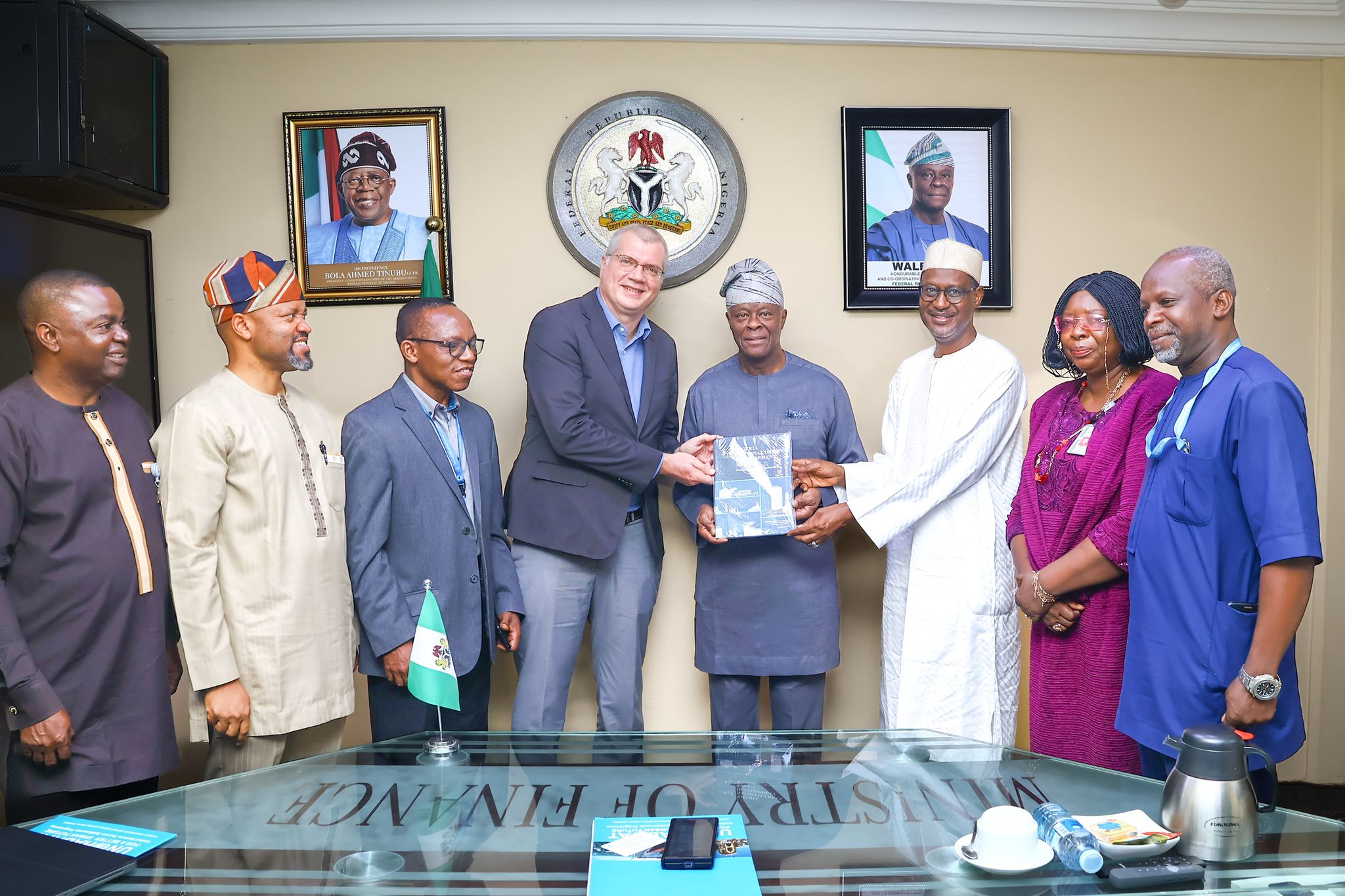By Oladosu Adebola Oluwaseun Abuja, Nigeria
The Honourable Minister of Finance and Coordinating Minister of the Economy, Mr. Wale Edun, today emphasized the critical role of comprehensive land reforms in transforming Nigeria’s urban landscapes, fostering economic growth, and significantly contributing to job creation. The Minister’s remarks came during a strategic dialogue with a delegation from the United Nations Human Settlements Programme (UN-Habitat), led by the African Regional Director, Mr. Mathias Spaliviero, in his office in Abuja. The meeting underscored the shared vision of accelerating sustainable urban development and unlocking investment opportunities across Nigeria.
Mr. Edun expressed enthusiastic welcome for UN-Habitat’s offer of technical support, recognizing its invaluable contribution to shaping modern, investable urban spaces. He highlighted that such expertise is crucial for Nigeria, particularly in cities that are long overdue for structured renewal and development. The Minister’s focus was clear: land reforms are not merely administrative adjustments but fundamental catalysts for broader economic objectives. He elaborated on how these reforms are intrinsically linked to job creation, through stimulating construction, real estate, and associated industries. Furthermore, he pointed out their potential to significantly enhance state-level revenue, providing much-needed funds for public services and infrastructure development. The reforms are also seen as a crucial enabler for public-private collaboration, creating a more conducive environment for partnerships that can drive urban transformation.
The conversation between the Minister and the UN-Habitat delegation delved deep into the catalytic role of land titling, documentation, and spatial planning. Mr. Edun stressed that these elements are foundational to unlocking investment into Nigeria’s urban infrastructure and housing sectors. Without clear and secure land rights, investors face significant risks, deterring the capital flows necessary for large-scale development. Efficient land documentation processes reduce red tape, improve transparency, and build investor confidence. Similarly, strategic spatial planning ensures that urban development is orderly, sustainable, and aligned with economic growth objectives, preventing haphazard expansion and maximizing the utility of available land.
UN-Habitat, through its African Regional Director, Mr. Mathias Spaliviero, unequivocally expressed strong support for the Federal Government’s renewed commitment to the Nigeria Land Titling and Documentation Programme. This program is a cornerstone of the government’s strategy to address historical challenges in land administration and to create a more robust and attractive investment climate. UN-Habitat recognized the program’s multifaceted benefits, which include improving land security for citizens and businesses alike. Secure land tenure empowers individuals and communities, facilitating access to credit and fostering a sense of ownership essential for long-term development.
Beyond individual security, the program is designed to expand the tax base. Formalizing land ownership and transactions allows for more efficient collection of property taxes and other land-related revenues, providing state governments with a more stable and substantial income stream. This increased revenue can then be reinvested into public services, infrastructure, and urban amenities, creating a virtuous cycle of development. Most importantly, the program aims to stimulate private capital flows into critical sectors such as real estate, agriculture, and logistics. For instance, in real estate, clear titles encourage developers to invest in housing and commercial properties, knowing their investments are secure. In agriculture, secure land tenure allows farmers to invest in long-term improvements, increasing productivity and food security. In logistics, well-planned and documented land parcels are essential for the development of warehouses, distribution centers, and transportation hubs, all of which are vital for a modern economy.
Mr. Edun highlighted that the current administration views land reform as a foundational pillar of its economic agenda. “Our cities hold immense untapped potential,” he stated, “but this potential cannot be fully realized without addressing the systemic issues in land administration. Clear, secure, and easily transferable land rights are not just about property ownership; they are about economic empowerment, job creation, and attracting the scale of investment needed to truly transform our urban centers into engines of growth.” He further elaborated on the government’s commitment to leveraging technology and best practices in land management to streamline processes and reduce the prevalence of disputes and fraud that have historically plagued the sector.
The Minister also stressed the importance of effective collaboration between federal and state governments. “While land matters are largely under the purview of states,” he explained, “the Federal Government has a critical role in providing policy direction, technical support, and frameworks that encourage uniformity and best practices across the nation. The Nigeria Land Titling and Documentation Programme is designed to offer a national framework that states can adapt and implement, ensuring consistency and promoting investor confidence across different jurisdictions.” He acknowledged that the successful implementation of these reforms would require sustained political will, public awareness, and robust institutional capacity building at all levels of government.Mr. Spaliviero, on behalf of UN-Habitat, reiterated the organization’s readiness to deploy its global expertise and resources to support Nigeria’s land reform initiatives. He commended the Minister’s vision and the Federal Government’s proactive approach, noting that well-executed land reforms have consistently proven to be a game-changer for developing economies. He emphasized that UN-Habitat’s support would extend to areas such as developing robust land information systems, building the capacity of land administration professionals, and providing technical assistance in urban planning methodologies that are both inclusive and economically viable. The dialogue concluded with a shared commitment to developing a detailed roadmap for collaboration, ensuring that the momentum generated from this strategic meeting translates into tangible progress on the ground, ultimately benefiting millions of Nigerians through improved living standards, increased economic opportunities, and sustainable urban development.
